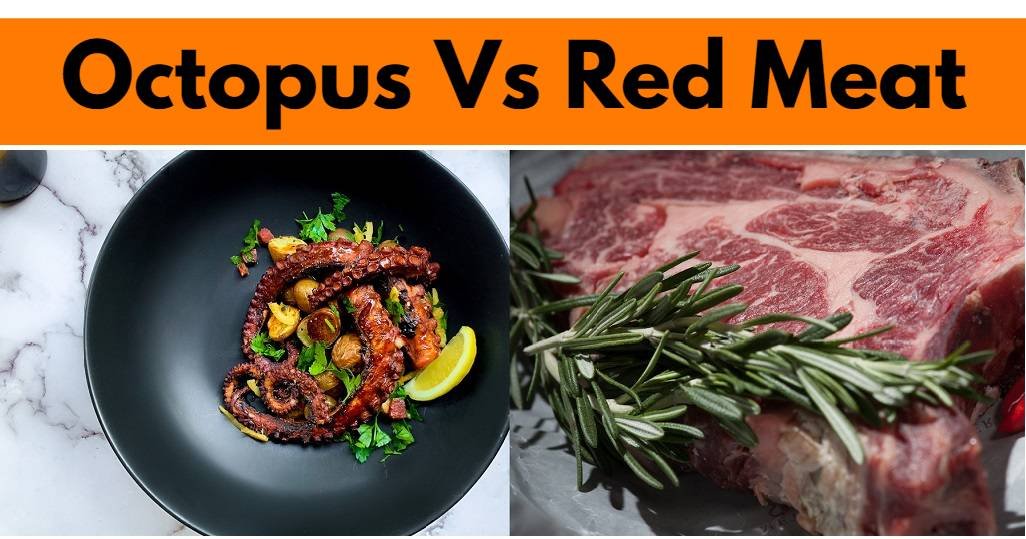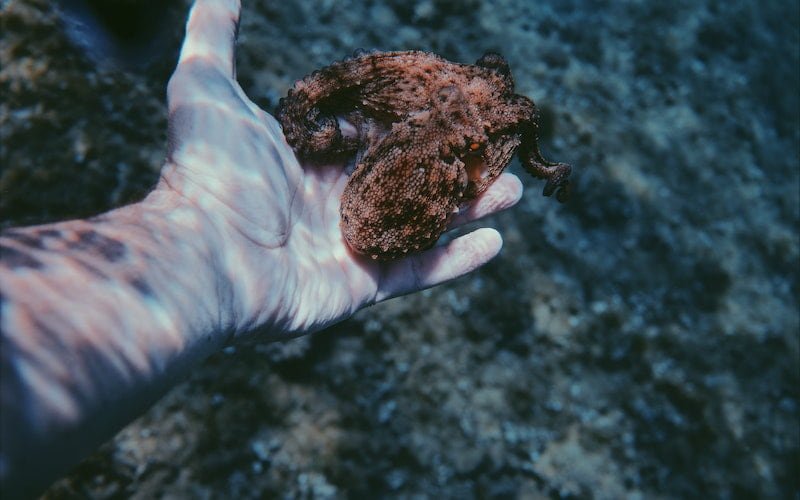Octopus vs Red Meat: A Nutritional Comparison

In this Octopus vs Red Meat article, we explore the nutritional differences between these two types of protein sources.
Octopus, a popular seafood choice in many cultures. It has gained popularity in recent years as a protein option for those looking to mix up their meal choices.
On the other hand, red meat, such as beef and pork, has long been a staple protein in many diets around the world. But which of these options is the healthier choice?
We will be examining the various nutrients present in both octopus and red meat, as well as the potential health benefits and drawbacks of each. So let’s dive in and compare the nutrition of octopus and red meat!
Octopus vs Red Meat Nutrition Comparison
Note: Nutritional values may vary depending on the specific type and cut of octopus or red meat. These values are meant to be used as a general comparison only.
| Nutrient | Octopus (100g) | Red Meat (100g) |
|---|---|---|
| Calories | 98 | 250 |
| Protein (g) | 18 | 26 |
| Fat (g) | 1 | 17 |
| Saturated Fat (g) | 0.3 | 6 |
| Cholesterol (mg) | 70 | 90 |
| Sodium (mg) | 280 | 70 |
| Carbohydrates (g) | 2 | 0 |
| Fiber (g) | 0 | 0 |
| Sugar (g) | 0 | 0 |
| Vitamin B12 (mcg) | 23 | 2.4 |
| Iron (mg) | 3.9 | 3 |
| Zinc (mg) | 7.8 | 6.7 |
| Copper (mg) | 0.4 | 0.4 |
| Selenium (mcg) | 52 | 35 |
What conclusions can we draw from the above data?
From the data provided, we can draw a few conclusions about the nutritional differences between octopus and red meat:
☝️ It’s important to note that these are general conclusions based on the average nutritional values of octopus and red meat. Individual nutritional needs may vary, and it’s always a good idea to consult a healthcare professional for personalized nutrition advice.

What Are The Benefits of Eating Octopus?
Octopus is a rich source of nutrients and can provide several health benefits when consumed on a regular basis. Some of the most important benefits of eating octopus include:
☝️ It’s important to note that octopus should be consumed in moderation as part of a balanced diet, as it is high in sodium and can increase cholesterol levels.
What does octopus meat taste like?
Octopus meat has a firm, tender texture and a mild, slightly sweet taste. It can be cooked in a variety of ways, including grilling, frying, boiling, or baking. Many chefs serve it with extra virgin olive oil and lemon for maximum taste.
Some people describe the taste of octopus as being similar to that of scallops or squid. The taste of octopus can be enhanced with the use of marinades, spices, or sauces.
It is commonly used in Mediterranean, Asian, and Latin American cuisines.
Here’s a short five minute video from Spanish chef Bruno Albouze that shows how to properly cook octopus to reach a restaurant level cooking.
Is Octopus considered Red Meat?
No, octopus is not considered red meat. Red meat is defined as meat that is red or pink in color when raw and comes from mammals such as cattle, pigs, and goats.
Octopus, on the other hand, is a type of seafood that belongs to the mollusk family. It is not considered red meat.
How much cholesterol in octopus?
Octopus – as per the nutritional comparison table above, has 70 milligrams of cholesterol for every 100 g. The recommended dietary cholesterol intake per day should be no more than 300 mg day.
Can You Eat Raw Octopus?
Yes, raw octopus is considered a delicacy in some countries and cultures, such as Japan and Korea, where it is often served in dishes like sashimi and sushi.
However, it’s important to note that eating raw octopus can pose some health risks, as it may contain harmful bacteria or parasites that can cause food poisoning.
So, it’s always best to thoroughly clean and cook the octopus before consuming it.
Where can you get fresh octopus from?
Fresh octopus can be found at many seafood markets and specialty stores. Some grocery stores may also carry it, but the selection may be limited.
If you’re having trouble finding fresh octopus in your area, you can also try ordering it online from a reputable seafood supplier.
Is frozen octopus any good?
Frozen octopus can be just as good as fresh octopus if it has been properly stored and thawed. However, the texture of frozen octopus can sometimes change and become rubbery, so it’s important to be mindful of the cooking process and not overcook it.
If you’re using frozen octopus in a dish, be sure to thaw it slowly in the refrigerator or in cold water, and then use it right away.
Overall, it’s always best to use the freshest octopus possible for optimal flavor and texture.
Bottom Line
In conclusion, octopus and red meat are both good sources of protein with a variety of nutrients.
Octopus is lower in calories and fat compared to red meat, and it is also a good source of vitamin B12, iron, zinc, copper, and selenium.
However, octopus does contain more cholesterol and sodium than red meat.
Ultimately, the best choice for you will depend on your individual nutritional needs and preferences.
It’s always a good idea to consult a healthcare professional for personalized nutrition advice.
Read Next
